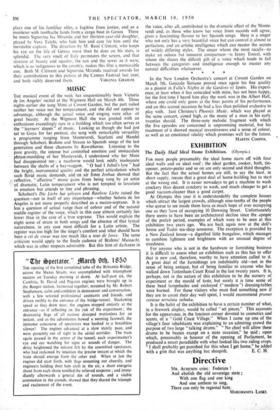MUSIC
THE musical event of the week has unquestionably been Victoria de los Angeles' recital at the Wigmore Hall on March 4th. Three nights earlier she sang Mimi at Covent Garden, but the part suited neither her voice nor her temperament, and she did not appear to advantage, although the actual voice and singing were ofter of great beauty. At the Wigmore Hall she was greeted with an enthusiasm exceedingly rare in a building which too often serves as the "learners' slopes" of music. Looking as though she had just sat to Goya for her portrait, she sang with remarkable versatility a programme ranging from Monteverdi, Scarlatti and Handel through Schubert, Brahms and Strauss to Spanish songs of the last generation and three chansons by Rawsthorne. Listening to the pure gravity, the intense but controlled emotion and immaculate phrase-moulding of her Monteverdi, I understood why her Mimi had disappointed me ; a racehorse would look oddly inadequate between the shafts of a hay-waggcin. "0 had I Jubal's lyre" had the bright, instrumental quality and the perfect articulation which such florid music demands, and an air from Joshua showed that e reflective, " affective " music -gains from being sung by an artist of dramatic, Latin temperament who is not tempted to luxuriate in emotion but attends to line and phrasing.
Schubert's Die Liebe hat gelogen and Rastlose Liebe raised the question—not in itself of any importance—whether Senora de los Angeles is not more properly described as a mezzo-soprano. It is less a question of actual range than of colour and of the natural middle register of the voice, which in this case almost certainly lies lower than in the case of a true soprano. This would explain the slight sense of strain in both songs and the absence of that lyrical naturalness, in any case most difficult for a Latin artiste. The register was too high for the singer's comfort and what should have been a cri de coeur was too much like a tour de force. The same criticism would apply to the finale cadence of Brahms' Mainacht, which was in other respects admirable. But this hint of darkness in the voice, after all, contributed to the dramatic effect of the Monte- verdi and, as those who know her voice from records will agree, gives a fascinating flavour to her Spanish songs. Here is a singer who not only has a very beautiful voice but can control it almost to perfection, and an artistic intelligence which can master the secrets of widely differing styles. The singer whom she most recalls—to make an odious but innocent comparison—is Jenny Tourel, with whom she shares the diffcult gift of a voice which tends to fall between the categories and intelligence enough to master any natural difficulties whatsoever. * * In the New London Orchestra's concert at Covent Garden on March 5th, Gonzalo Soriano proved once again his fine quality as a pianist in Falla's Nights in the Gardens of Spain. His experi- ence, at least when it has coincided with mine, has not been happy, for the first time I heard him play the work was in the Albert Hall, where one could only guess at the finer points of his performance, and on this second occasion he had a less than polished orchestra to play with. Jani Christou's Phoenix Music, which was played at the same concert, aimed high, as the music of a man in his early twenties should. The three-note melodic fragment with which the five episodes are concerned is unpromising material, but his treatment of it showed musical inventiveness and a sense of colour, as well as an emotional vitality which promises well for the future.
MARTIN COOPER.


































 Previous page
Previous page